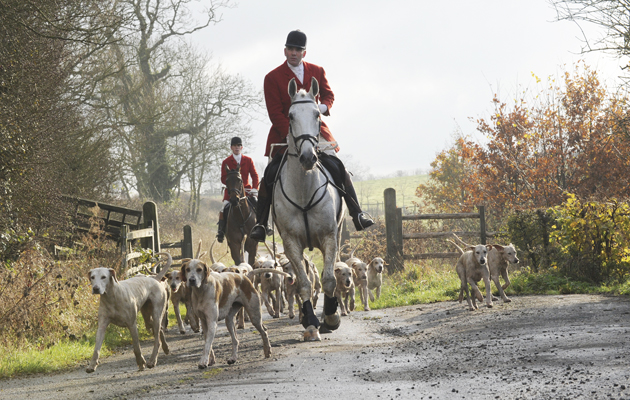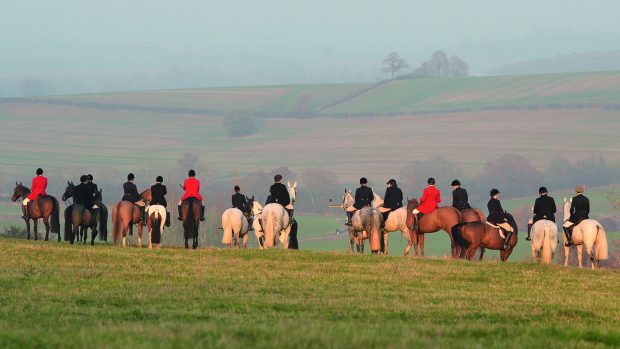Never been hunting, but would love to have a go? H&H explains how to get started and answers your questions during hunting’s Newcomers’ Week (21-28 October 2023)
Never been trail hunting, but would love to have a go? H&H explains how to get started with our beginner’s guide to trail hunting, which answers the most common questions from first-timers ahead of Newcomers’ Week (21-28 October 2023).
How do I find out where to go?
To find your local hunt, visit bhsa.org.uk. Then ring the hunt secretary. This applies for any day’s hunting when you are not a subscriber to that particular pack. Ask him or her whether you can come out, where the meet is, where you should park and how much you have to pay. This is called the “cap”. It will vary enormously between hunting countries depending on how old you are and whether you are planning to follow on a horse or on foot. Packs often do good deals for under-25s and people who farm within the hunting country.
Do I need a companion?
If you can persuade a hunting friend with a well-behaved horse to accompany you, great, particularly if your horse hasn’t been out before. But it’s not essential. Tell the hunt secretary this is your first time, or that you are fairly inexperienced on the hunting field. He/she may be able to suggest someone to look after you for the day, and at least will be aware and able to keep an eye on you.
Is my horse suitable?
The answer is that you don’t really know until you get there, but there is no reason why any horse shouldn’t learn to hunt well. Many horses get a little overexcited by being at such a terrific “party”, but can you blame them? Autumn hunting is perfect for horses who haven’t hunted, and for young, green animals because things happen at a more gentle pace. There is often more standing-around time for them to absorb what’s going on. If your horse is used to busy collecting rings and doesn’t mind dogs around his feet, there’s every chance he’ll be fine. Use your brain and stay to the side of the main field so your horse has a chance to look at what’s going on, rather than throwing him straight into the middle of the group.
Do I need to plait?
Not during autumn trail hunting, which extends until the opening meet at the beginning of November. After that most people will plait up, out of smartness and courtesy to those whose land they are crossing, but it’s not compulsory. Manes should be neat, tidy and clean, but you shouldn’t get sent home for not plaiting.
What should I wear?
Looking smart is essential – think competition smart and take pride in your appearance. a tweed jacket and shirt (with tie collar) and tie or shirt (with stock collar) and coloured stock, pale breeches, clean short boots and gaiters/half-chaps or long boots, dark gloves and a hat with a dark cover.
After the opening meet, in the season proper, adults tend to wear black or navy coats, but you will see some in tweed. If you don’t own a tweed coat for autumn hunting, don’t worry about it too much. Girls: make use of a hairnet, make-up is fine, but not don’t overdo it, and take off jewellery unless you want to risk tearing your earlobes off on low branches. Body protectors are acceptable, but wear it under your jacket rather than over it if you can.
What should my horse wear?
If you aren’t sure about your brakes, err on the side of caution or take a stronger bit/martingale in the lorry with you. Numnahs should be dark and follow the shape of the saddle — save that white dressage square for another day. If you know your horse might kick, put a red ribbon on his tail and stay well out of the way whenever possible. Kicking a horse or a rider is bad enough, but kicking a hound is the worst thing you can do. You will get sent home, so make sure your horse’s head is turned towards hounds, not his backside. A green ribbon denotes a young horse, and if someone puts the back of their hand in the hollow of their back, it means “don’t get too close”.
Should he wear boots?
This is up to you. If you live in wall country, knee boots are de rigeur. Otherwise it’s your choice, and you know what suits your horse. But remember the boots will be on for a lot longer during the course of a hunting day than they would be during a cross-country round, and the risks of rubbing and overheating are greater. You’ll find plenty do and plenty don’t.
Will I have to jump huge hedges?
Of course not. Even if your hunt has a reputation for being a serious jumping pack, you can always go round — and there will be other people taking the roundabout route, too. Only jump what you feel happy with; it’s not a competition.
How fit does my horse need to be?
Very rarely does trail hunting involve galloping flat-out for very long, and autumn hunting in particular can involve a lot of standing around. Your horse needs to be fit enough to canter up a hill without collapsing, but really doesn’t need to be racehorse-fit. And you can go home whenever you like — don’t feel compelled to stay out for hours if you and your horse are knackered.
Golden rules for first-timers
- Find out who the master is and say good morning
- Never overtake the field master, and always listen carefully to his instructions
- Always thank traffic that slows down or stops
- Never block the road
- Don’t park in gateways or driveways unless specifically told you can
- If you hear the shout “huntsman please!” or “whip please!” get out of the way sharpish so they can get through
- Always call them hounds, not dogs
- If the person in front of you shouts “gate, please!”, pass it back to the next person, unless you are last through, in which case you should shut it, unless told otherwise
- Do turn your mobile phone off, and talk quietly while standing at the side of a covert — the huntsman will not be pleased to hear you shrieking about what you got up to the night before
- Never ride across the middle of a field of sown corn, even if you see hunt staff doing so
- Do ask questions about what is going on. The more you understand about a day’s hunting, the more you will enjoy it. People will be very happy to answer your queries
- Do find the field master/master/secretary before you go home and say thank you and good night, which is the traditional way to say goodbye — even at 9am
You might also be interested in:

8 ways to avoid looking flustered on your first day autumn hunting

Autumn hunting: Horse&Hound’s dos and don’ts for first-timers
Autumn hunting is a gentle introduction for young hounds, new hunt staff, horses and followers to the forthcoming season. Carina

Subscribe to Horse & Hound magazine today – and enjoy unlimited website access all year round
Horse & Hound magazine, out every Thursday, is packed with all the latest news and reports, as well as interviews, specials, nostalgia, vet and training advice. Find how you can enjoy the magazine delivered to your door every week, plus options to upgrade your subscription to access our online service that brings you breaking news and reports as well as other benefits.



